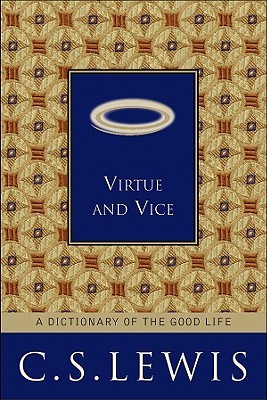- Biblia
- Leer la Biblia
- Versiones de la Biblia
- Verso del dia
- Planes de lectura
- Versos por tema
- Books of the Bible
- Imágenes De La Biblia
- Estudio
- Comentarios
- Concordancias
- Diccionarios bíblicos
- Enciclopedias bíblicas
- Sermones
- Bible Atlas & Maps
- BP Wiki
- Devocionales
- Devocionales de hoy
- Light of the World
- Todos los devocionales
- Inspirational Quotes
- Más
- Picture Quotes
- Videos
- Inspirador
- Estudio Bíblico
- Lo que dice la Biblia
- Bible Q&As
- Daily Bread
- Bible by Genre
- Bible Stories
- Random Bible Verse
- Comunidad
- Store
Virtue and Vice: A Dictionary of the Good Life
by C.S. Lewis
A Pocket Guide to Goodness
Few writers have inspired more readers than author C. S. Lewis -- both through the enchanting volumes of his children's series and through his captivating adult classics such as Mere ChristianityMere Christianity, The Screwtape LettersThe Screwtape Letters, The Great DivorceThe Great Divorce, and numerous others.
Drawn from many works, this volume collects dictionary-like entries of Lewis's keenest observations and best advice on how to live a truly good life. From ambition to charity, despair to duty, hope to humility, Lewis delivers clear, illuminating definitions to live by.
Few writers have inspired more readers than author C. S. Lewis -- both through the enchanting volumes of his children's series and through his captivating adult classics such as Mere ChristianityMere Christianity, The Screwtape LettersThe Screwtape Letters, The Great DivorceThe Great Divorce, and numerous others.
Drawn from many works, this volume collects dictionary-like entries of Lewis's keenest observations and best advice on how to live a truly good life. From ambition to charity, despair to duty, hope to humility, Lewis delivers clear, illuminating definitions to live by.
Hardcover, 112 pages
Published February 22nd 2005 by HarperOne (first published February 15th 2005)
Suscribir
© 2025 Bibleportal.com Reservados todos los derechos.

Clive Staples Lewis was born in Ireland, in Belfast on 29 November 1898. His mother was a devout Christian and made efforts to influence his beliefs. When she died in his early youth her influence waned and Lewis was subject to the musings and mutterings of his friends who were decidedly agnostic and atheistic. It would not be until later, in a moment of clear rationality that he first came to a belief in God and later became a Christian.
C. S. Lewis volunteered for the army in 1917 and was wounded in the trenches in World War I. After the war, he attended university at Oxford. Soon, he found himself on the faculty of Magdalen College where he taught Mediaeval and Renaissance English.
Throughout his academic career he wrote clearly on the topic of religion. His most famous works include the Screwtape Letters and the Chronicles of Narnia. The atmosphere at Oxford and Cambridge tended to skepticism. Lewis used this skepticism as a foil. He intelligently saw Christianity as a necessary fact that could be seen clearly in science.
"Surprised by Joy" is Lewis's autobiography chronicling his reluctant conversion from atheism to Christianity in 1931.
... Show more